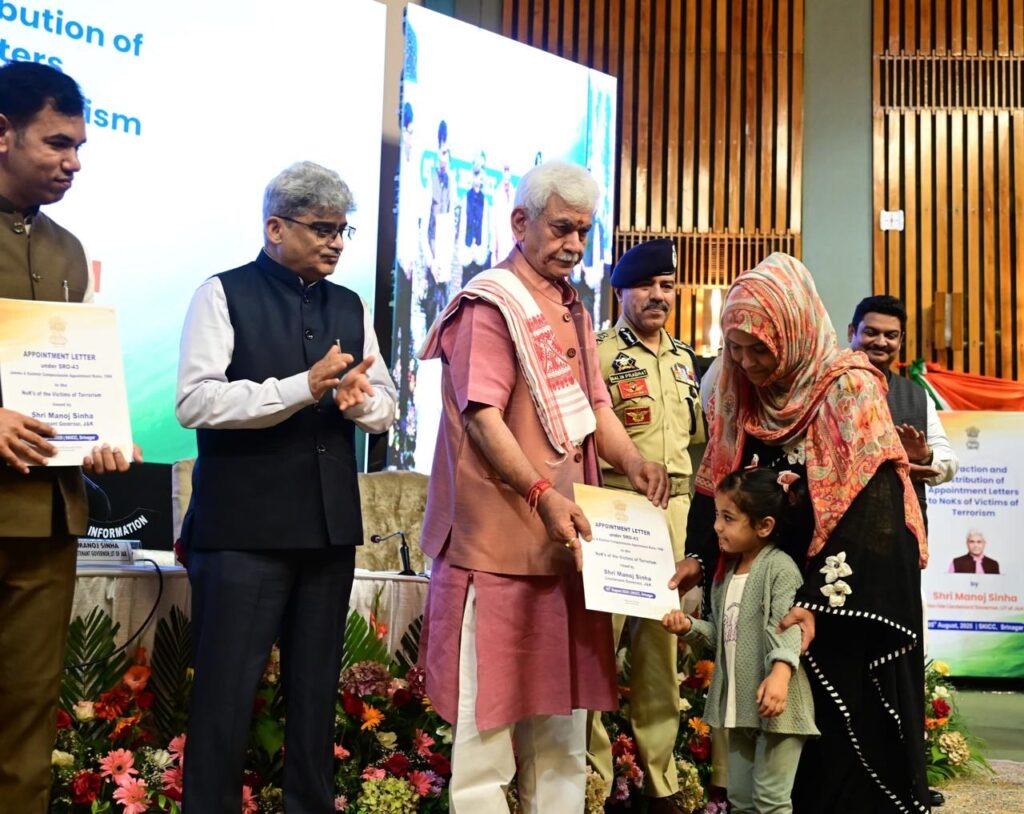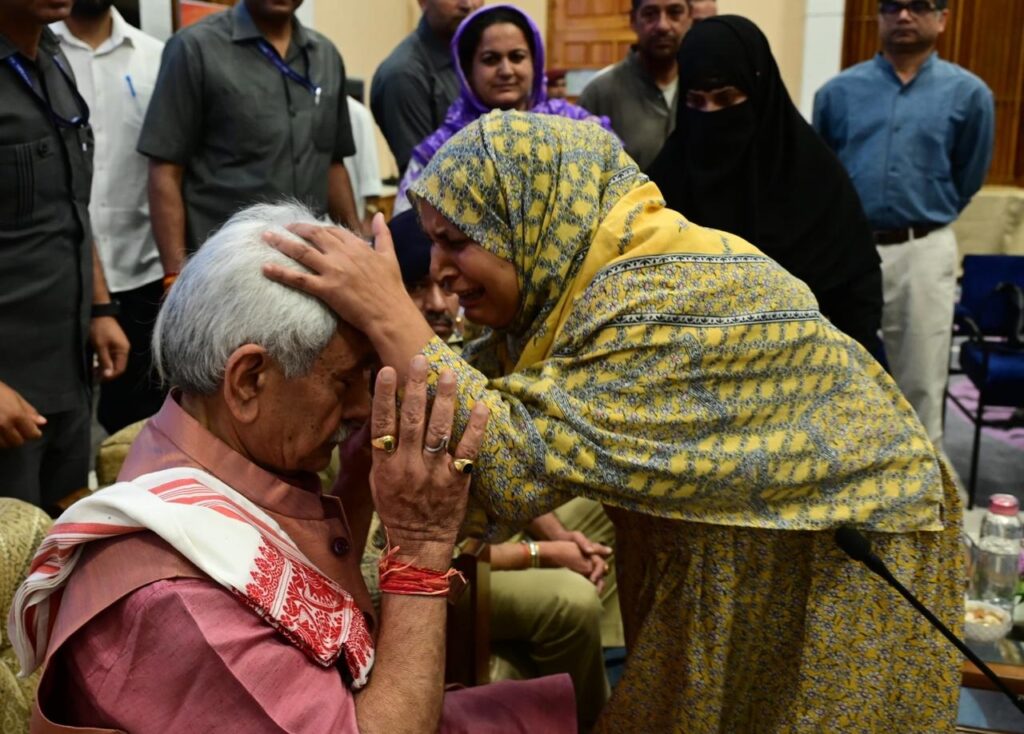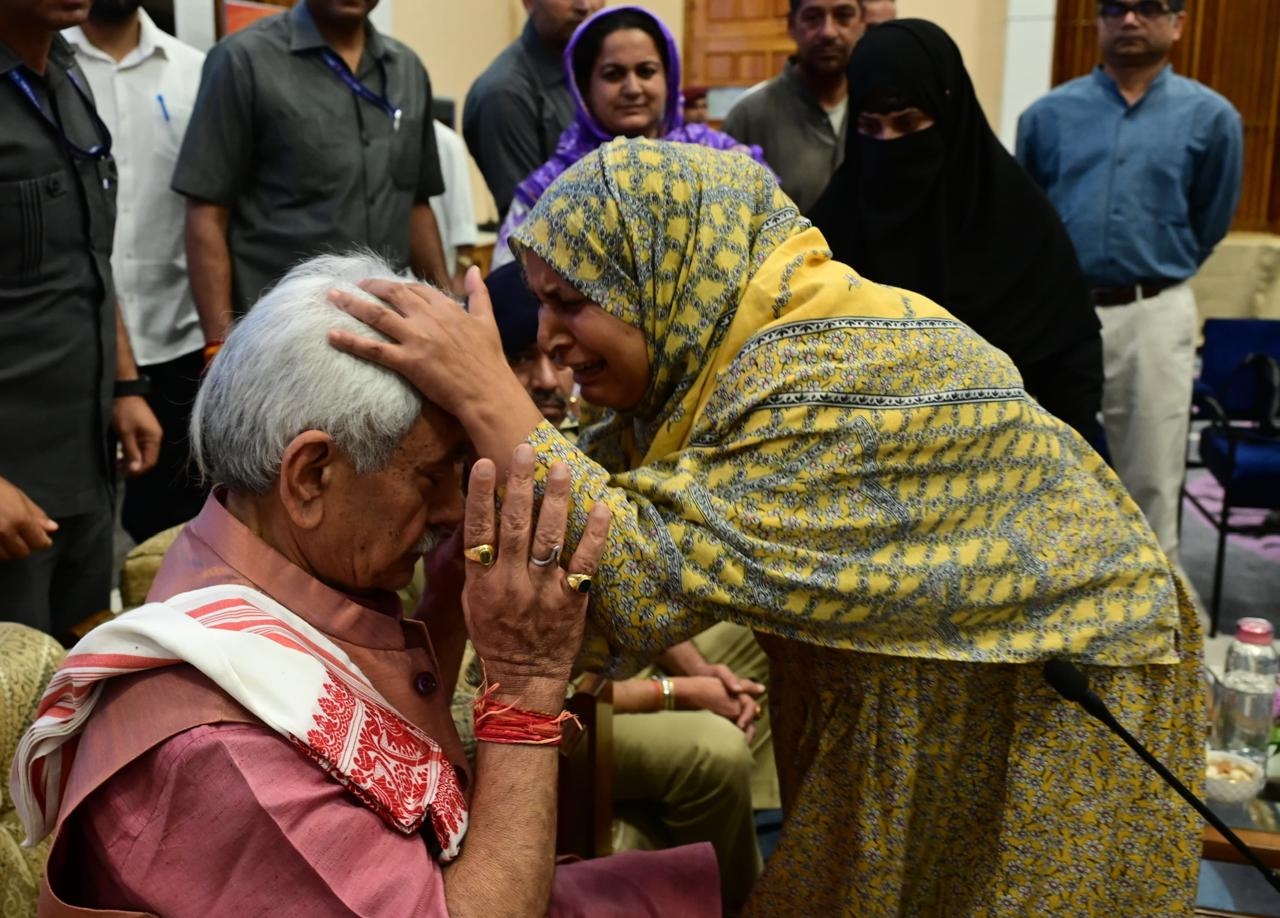By Ajaz Rashid
For many in Kashmir, grief has been an uninvited companion for decades, lingering in silent corners of homes, etched into the lines of mothers’ faces and the unspoken gazes of orphaned children. On Tuesday, at SKICC in Srinagar became the stage for an unprecedented moment of closure, as Lieutenant Governor Manoj Sinha personally handed over appointment letters to 158 Next of Kin (NoKs) of civilians killed by Pakistan-backed terrorism.
It was not just a government function — it was, in the words of the LG, “a day when wounds that have persisted for decades begin to heal.”

An Event Steeped in History and Emotion
The gathering brought together families from every corner of Jammu and Kashmir, many of whom have lived for decades under the shadow of loss. Some arrived carrying faded photographs of loved ones, others clutching appointment letters that symbolized more than employment — they symbolized long-overdue recognition.
For over thirty years, as Sinha noted, “the terror state of Pakistan has shed innocent blood through its proxy outfits.” The families present have borne this reality in the most personal way — through empty chairs at dinner tables, incomplete family photographs, and dreams abruptly halted.
Stories of Loss, Now Stories of Dignity
The event was punctuated with recollections of lives cut short:
- Abdul Majid Mir of Sheikhpura, Baramulla, kidnapped and murdered on June 29, 2004, leaving his family to survive on a meagre ex-gratia payment of ₹1 lakh. Today, his son Mudasir Majid walked away with a government job appointment, a step toward reclaiming dignity.
- Abdul Majeed Wani of Anantnag, gunned down in 1994. His son, Suhail, waited 31 years before receiving justice in the form of employment.
- SPO Manzoor Ahmad Rather of Warpora, Baramulla, killed in 2000, whose family received no support for 25 years. Today, his son Khurshid finally found relief.
- The Dar family of Pulwama, shattered when terrorists murdered Ghulam Qadir Dar in 1996, and again in 2004 when they killed his son Aijaz Ahmad. Nearly three decades later, surviving son Parvez Ahmad’s long nightmare has eased.
“These jobs cannot fill the void,” Sinha admitted, “but they can ensure that these families live with dignity.”
From Article 370 to the ‘New Jammu and Kashmir’
Sinha’s speech also mapped the political journey of the Union Territory since August 5, 2019 — the day Article 370 was abrogated.
“Because of Article 370, terrorism had increased and the terror ecosystem was emboldened,” he said. “The dismantling of that ecosystem began on August 5, 2019. The new Jammu and Kashmir is one where jobs are given to the real martyrs, not to terrorists; where the tears of common Kashmiris are wiped away, not shed for the death of militants.”
He was unapologetic about the administration’s purge of “terrorist elements sitting in the government system” and emphatic that in the new J&K, “children have pens in their hands, not stones.”
A Firm Stand Against Terrorism
Sinha reiterated that under Prime Minister Narendra Modi’s leadership, India has “drawn a new red line” against terrorism: “If terror is state policy, it will be met with a visible and forceful response.” He assured the NoKs that perpetrators and sympathizers of terrorism would face “the harshest possible punishment.”
Calling peace “a prerequisite for progress,” he urged every citizen to take a pledge to prevent the repetition of past tragedies.
Streamlined Support for Victims
Beyond the symbolic power of the day, the administration announced practical measures. A dedicated web portal now allows terror victim families to apply for relief, compassionate appointments, and other assistance. Helplines have been established at district and divisional levels to ensure that no family is lost in bureaucratic limbo.
Officials from across the civil and police administration — including Chief Secretary Atal Dulloo, DGP Nalin Prabhat, and senior officers — were present, underscoring the weight of the moment.

Milestones in a Continuing Journey
Today’s ceremony follows similar historic events on July 13 in Baramulla and July 28 in Jammu. The administration’s stated goal is to reach every genuine case, delivering justice and opportunity even decades after tragedy.
For the families, these letters are more than pieces of paper — they are acknowledgements of sacrifice, of the years spent carrying grief in silence. They are also, perhaps, a glimpse into a Kashmir where victims are remembered, and where the dreams of those who died too soon may finally be fulfilled through the lives of their children.
